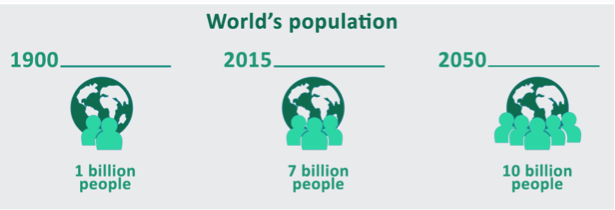Environmental challenges
Resource management: naturally and inevitably disruptive

The combination of heavier demand and scarcer resources is pushing many industries into reinventing themselves technologically. Their determination to reduce this shortfall has led to changes that in some fields are becoming secular in nature.
Whether climatic, environmental, or agricultural, the major shifts of recent decades have been driven by the same phenomenon: population growth.

This exponential growth is now bringing to light the equation of resources that will accompany it. Narrowing the structural deficit between needs and reserves is fundamental and vital for humanity. It has naturally taken shape in recent years as a major theme with intrinsically disruptive features and has been a rallying point for research and innovation.
This has been most clear in the shift in the energy sector with the boom in renewable energies. But, unlike traditional industries, it is multifaceted. It encompasses a universe of various sectors, including renewable energies, and gas, precision agriculture, smart grids, and energy efficiency and storage. Each field, in its own way, offers a unique form of disruption in how it addresses the issue of resources.
For example, recent developments in agriculture are pointing to an in-depth transformation in the coming years:
- Farming development has consisted in boosting yields by enhancing hybrid or organic seeds since the start of the Green Revolution in the 1960s;
- It will be based on juxtaposing several specialties to optimise fertilisation, planting and irrigation in the coming years. These sources of leverage will be called upon in synchronised fashion to enhance farming productivity.
- Some current avenues of development are increasing the depth of weather data and using biotechnologies to make grains 15% to 20% bigger.
- One day, autonomous tractors might farm fields that have been geo-located, mapped and classified by GPS. Like drones, this technological development will help mitigate the potential labour shortage that could be caused by the ageing of the farming population and will bring qualitative improvements through precision agriculture.
But for several years now, the focus has been on energy resources.
Optimising energy resources depends on several factors, such as the use of renewable energies. With its
90,000 terawatts, the sun delivers humanity’s annual consumption needs in an hour and a half. Photovoltaic research is focusing on boosting the yields of the raw material, i.e. silicon. In 2010, eight grams were needed to produce one watt. Now only five are.
A company like Trina Solar has shrunk its cost structure by 16% annually. This steady reduction has brought the price per kilowatt-hour to about 10 cents – or even 3 cents in place like the United Arab Emirates – a cost that is more or less comparable to natural gas.
The basic problem in energy remains storage but this issue is being revisited. It is no longer so much a question of storage capacities as an increasingly decentralised network architecture. The solution will probably require individual production and storage. This channel of development is drawing serious interest from companies like Tesla and Panasonic.
Pending a tangible revolution in this field, efforts in recent years have been in implementing smart grids. The boom in smart grids has been one response to new standards in managing resources in the urban environment. In concrete terms, the goal is to take environmental challenges into account in new buildings and to better optimise their consumption.
In a way, the smart grid is now laying out the contours of tomorrow’s cities in the area of safety, air conditioning, water and lighting. The sector has given rise to companies like Brown Equity, which, after initially specialising in LED lightbulbs, has expanded into platforms for managing building energy consumption. Another company is Badger Meter, which specialises in water monitoring systems, an area of special importance, given that 50% of reserves worldwide are currently wasted.
Management of natural resources is now an essential human development challenge.
Based on the principle that innovative solutions are necessary in this field, companies have begun a process of disruption that in many sectors is still just getting started. Industry has been quick to catch on to this theme in both the regulatory restrictions imposed on it and in the economic benefits it create.
In addition to innovation, human behaviour will have to evolve in this direction, and initiatives will have to be supported, including strong policy actions such as the Paris Agreement, in order to effectively meet environmental challenges.
